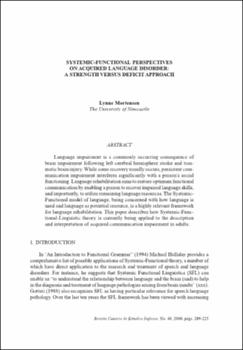Systemic-Functional Perspectives on Acquired Language Disorder: A Strength versus Deficit Approach
Autor
Mortensen, LynneFecha
2000Resumen
Language impairment is a commonly occurring consequence of
brain impairment following left cerebral hemisphere stroke and traumatic
brain injury. While some recovery usually occurs, persistent communication
impairment interferes significantly with a person’s social
functioning. Language rehabilitation aims to restore optimum functional
communication by enabling a person to recover impaired language skills,
and importantly, to utilize remaining language resources. The Systemic-
Functional model of language, being concerned with how language is
used and language as potential resource, is a highly relevant framework
for language rehabilitation. This paper describes how Systemic-Functional-
Linguistic theory is currently being applied to the description
and interpretation of acquired communication impairment in adults.





